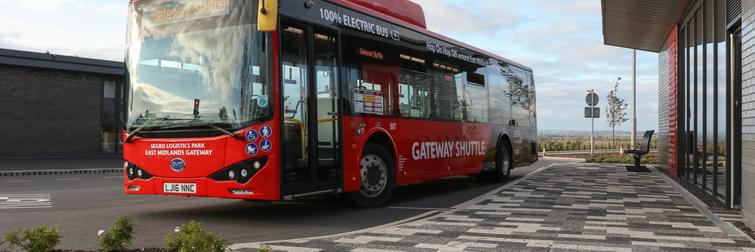
blog: Creating Better Places - East Midlands Gateway
Monday 3rd October 2022
SEGRO Logistics Park East Midlands Gateway (EMG) is a regionally significant employment centre adjacent to East Midlands Airport and within the East Midlands Freeport. The sustainable transport strategy which has been delivered alongside the development is the most successful of it’s kind (to the best of our knowledge!), with less than 50% of staff commuting alone in their car.
With over 6 million sqft of logistics accommodation and a 50-acre strategic rail freight terminal, EMG home to well-known names including Amazon, DHL, GXO, Very, Maritime, Kuehne + Nagel and Games Workshop. Collectively they employ over 5,500 people drawn from across the East Midlands.
Responsible SEGRO is a corporate framework to support SEGRO’s commitment to sustainability and low carbon growth. Sustainable commuting is integral to the Responsible SEGRO framework, hence EMG has been developed with a clear priority given to mitigating carbon emissions, supporting access to employment, and improving health and wellbeing of those that work at the site.
Achieving sustainable commuting patterns was recognised as a real challenge for EMG, given that the site is 13 miles from the closest city, located adjacent to the M1 with excellent road links, and with a plethora of shift patterns 24/7. There was a chance it could just be another out of town, car-dominated development.
Yet, by having a strong sustainable vision from the outset, embedding sustainable transport into the site infrastructure, and continuing to deliver impactful tenant and employee engagement campaigns around sustainable commuting, there are more employees commuting sustainably compared to the Travel Plan targets.
How has this been achieved?
ITP has been EMG’s Travel Plan Coordinator since 2012. During that time, we’ve...
What is the impact?
Changing ingrained habitual travel habits can be tough, but at a new development it presents a fresh opportunity to encourage sustainable commuting from the outset and influence travel choices through the delivery of new infrastructure and employee engagement. The transport impact of this proactive approach at EMG has been...
This matters because it demonstrates that with the right planning, developments can be built that champion sustainable commuting. It sets the challenge to the rest of the transport, planning and real estate industries to consider how they could play a part in delivering a more sustainable future.
Lessons Learnt
The techniques for achieving the success of EMG can be applied to other locations across the UK. The key lessons we’ve learnt are:
- Create a sustainable transport vision at the planning stage and secure buy-in from the developer, masterplanners, local stakeholders, local transport authorities and transport operators.
- Understand the existing transport connectivity to the site to develop a strategy that not only makes sustainable transport a viable option, but an appealing one. It could be a mix of infrastructure improvements, transport service enhancements and campaigns to encourage sustainable commuting.
- Provide realistic sustainable travel options from first occupation, to embed behaviours from the start rather than introducing them when capacity triggers are reached.
- Understand the prospective job roles, workforce demographics, and geography of the employment catchment to determine the factors that will influence employee transport choices. Use these insights to develop transport campaigns that will resonate with these future employees.
- Work alongside tenants’ HR teams and their recruitment consultants to provide information on commuting options in the job adverts, at recruitment fares and in screening interviews.
- Continue engaging with employees about their travel options throughout the year through activities, campaigns and challenges.
- Bring stakeholders along the journey with you by establishing a working group to share knowledge, jointly fund transport initiatives and be accountable for delivering on targets.
- It’s important to monitor travel behaviour to understand progress towards mode share targets and reducing carbon emissions.
For more information on how our Influencing Behaviour team are supporting developers and businesses to create a culture of sustainable committing please visit our website, or get in touch with Stephanie Meyers.
